The 16 Greatest Triathletes of All Time
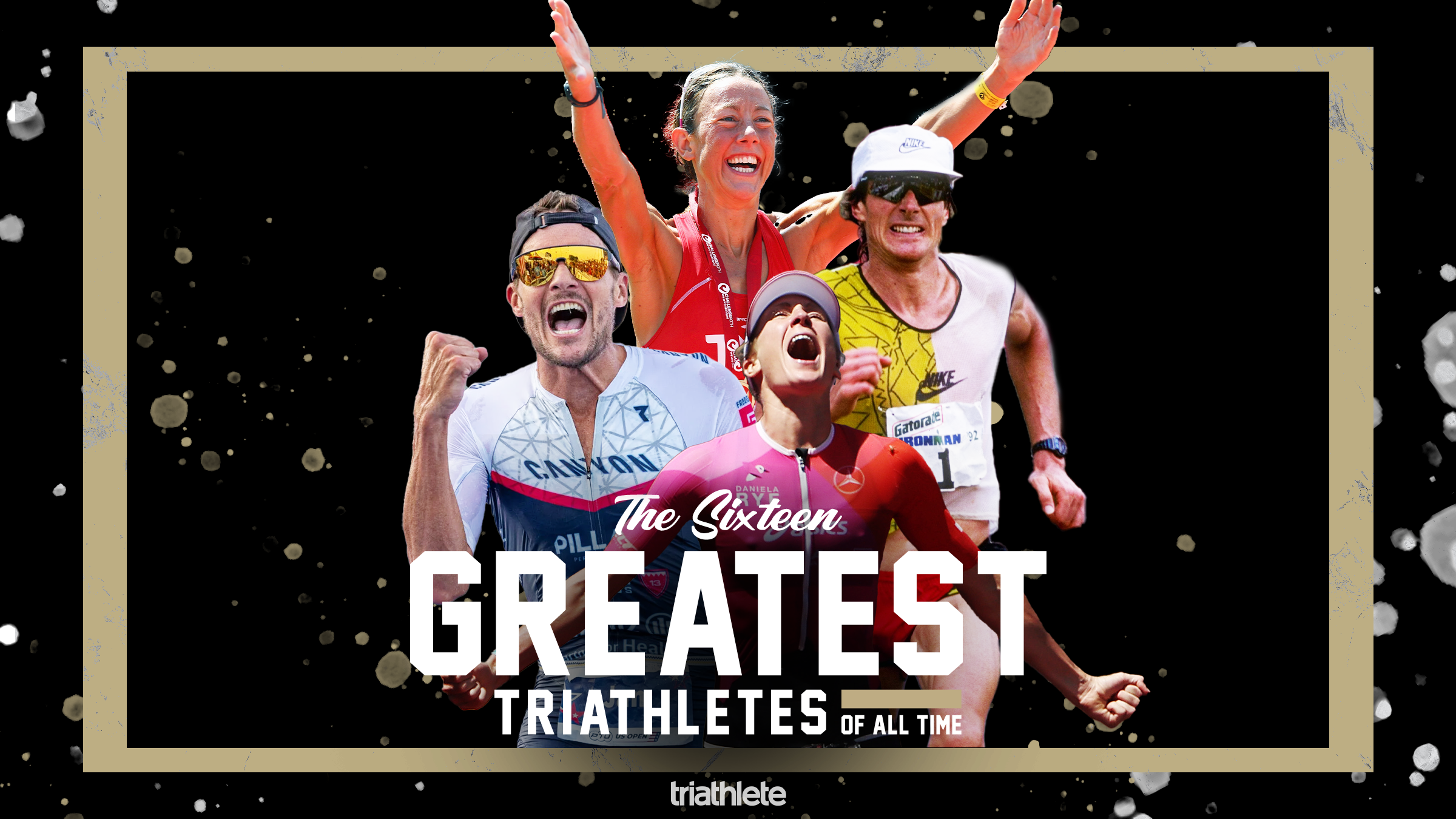
It's the question that will get any group of triathlon fans into a hot debate: Who are the best triathletes of all time? (Photo: Triathlete, Alexander Hassenstein, Mike Powell, Tom Pennington, Professional Triathletes Organization)
Identifying the greatest triathletes of all time is no easy feat. How do you compare the all-out grit required in 1989’s famous Iron War between Dave Scott and Mark Allen with the dominant performance by Gwen Jorgensen in the 2016 Rio Olympics? While there’s no perfectly scientific way to name and rank the top greatest triathletes of all time, it’s fun to try. In pulling together this list of 16, the following factors were taken into account.
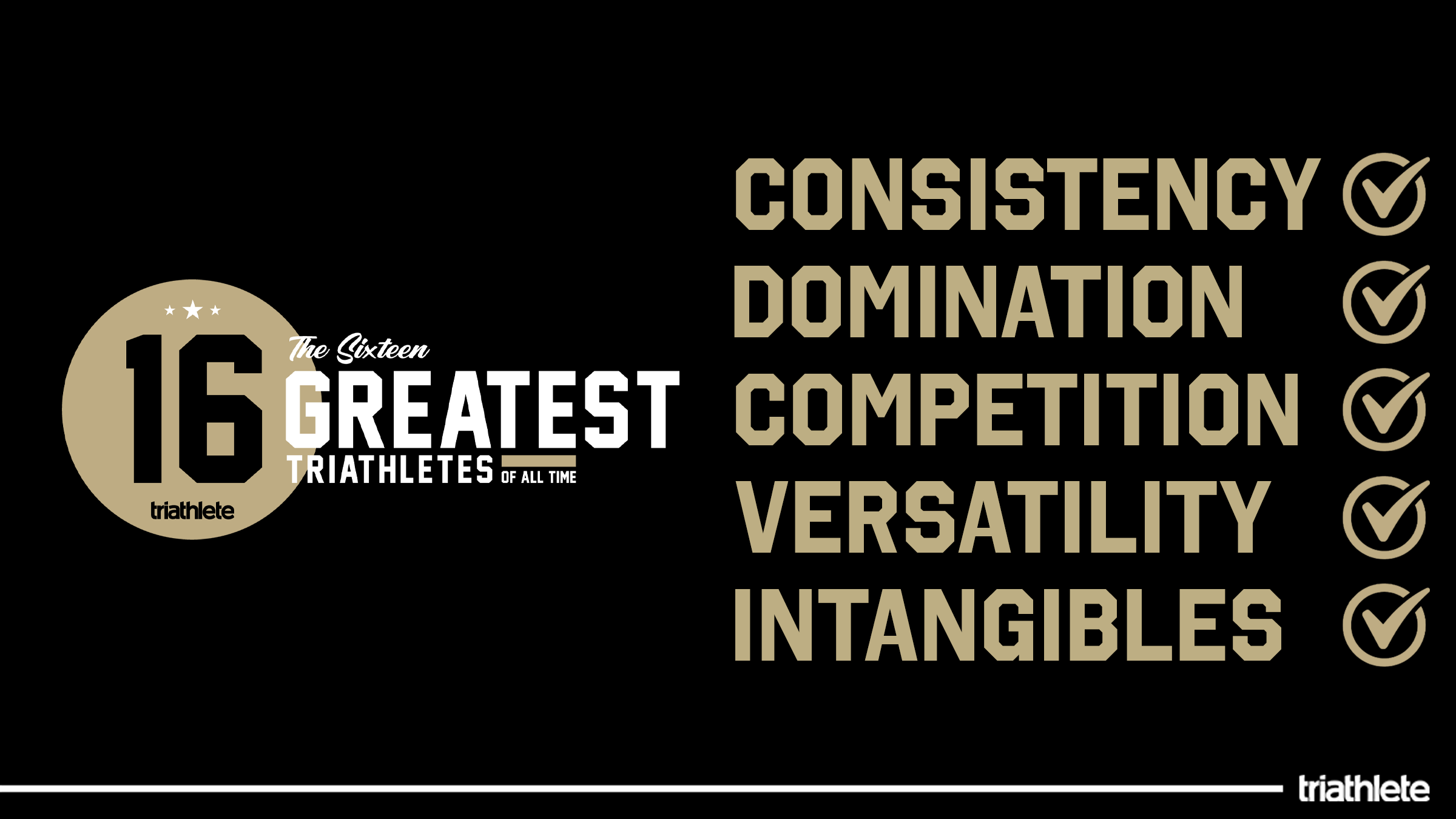
Consistency
How well did the triathlete perform from start to finish throughout his or her career? Did they win a world championship year after year? Maybe she went her entire career without ever losing at the iron-distance (looking at you Chrissie Wellington). In almost every case, these triathletes showed up to their events as the person to beat.
Domination
How did their performances move the sport forward? When triathletes turn in dominant performances, the ceiling of what is possible and what it takes to win shifts. This list of the greatest triathletes cumulatively had a huge role in shaping how we see the sport—and what it means to be a “great triathlete” today.
Competition
There are pockets within the sport where the competition was higher than others. What was the overall depth chart of the sport and the triathlete’s specific distance during their career?
Versatility
While it’s not necessary to make the list, a triathlete’s ability to jump across distances (Olympic-distance vs. iron-distance), disciplines (off-road vs. road), and styles (draft-legal vs. non-drafting) was part of the selection.
Intangibles
While it’s tempting to list out ranking factors and assign numbers, the reality is that there are several intangibles (as seen in the commentary from some of the sport’s experts) that are a part of the equation. We consider not only the hard result, but the level of pressure to perform. And now in 2025, we’ve also taken into account the athlete’s impact on the sport.
With all of those factors in mind, Triathlete presents our list of the greatest triathletes, ranked in ascending order from 16th to first.
Do you agree or disagree? Who would you have added to the list? Anyone who should have been left off? Share your thoughts over on Instagram, Twitter/X, and Facebook.
Video: Triathlon pros make their picks for the greatest of all time
We asked today’s top pros to name their personal GOATs, and their answers did not disappoint. Check out the video below to see who they named as the best triathletes of all time.
The 16 best triathletes in history
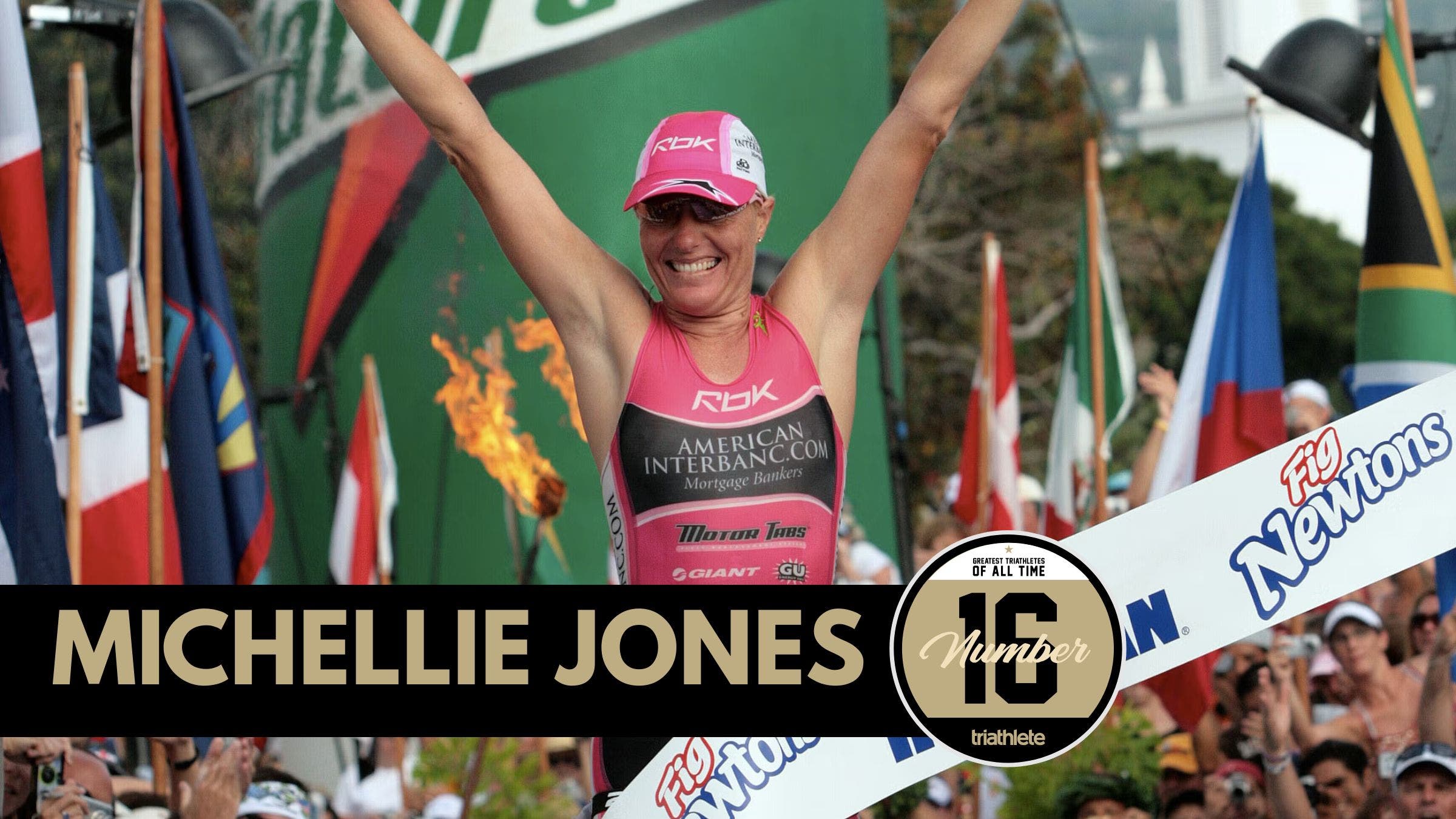
16. Michellie Jones (AUS)
Quick Highlights: Olympic silver medalist (2000), 2006 Ironman World Champion, two-time ITU Triathlon World Champion, and guide to 2016 Paralympic gold medalist Katie Kelly
The list of triathletes who have an Olympic medal and an Ironman World Championship is extremely short, but you need to look at more than simply the range of Jones’ accomplishments—from short course to long course.
For historical context, Jones was the first Australian woman to win an Ironman World Championship when she broke the tape in 2006. But on her first try (and second Ironman ever) in Kona in 2005, she took second place only to another great (look to number eight on our list), Natascha Badmann.
Aside from being a singular (and preternatural) talent at the top of the sport, Jones made a lasting impact by continuing to train and compete for nearly two decades—guiding Katie Kelly to gold at the first Paralympic paratriathlon event in 2016.
“In my humble opinion, Michellie Jones is one of the greatest female triathletes in history, if not the very best,” says triathlon legend and host of Breakfast with Bob, Bob Babbitt, noting her massive accomplishments above.
“But then you add in an XTERRA World Championship, 10 San Diego International Triathlon titles, seven USTS Chicago titles and eight Escape From Alcatraz titles—plus who knows how many Danskin Women’s Triathlon Series wins—and you’ve got one of the greatest triathlon careers of all time. Has there been another female triathlete who has been as brilliant at draft-legal, non-draft, off-road, Olympic format and Ironman? The answer is a resounding NO!”
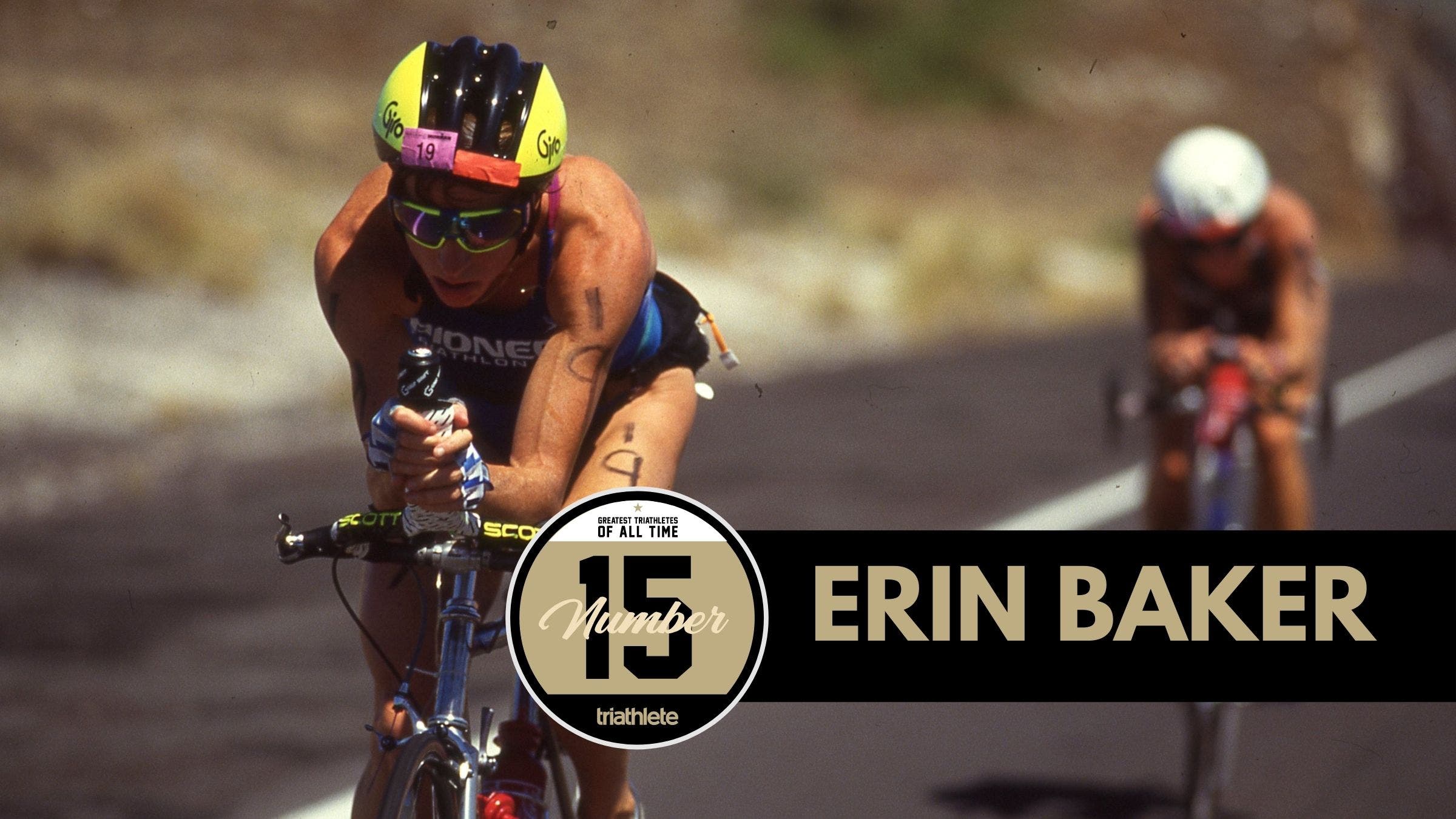
15. Erin Baker (NZL)
Quick Highlights: Two-time Ironman world champion (1987, 1990), 1989 ITU world champion, 1991 ITU duathlon world champion
As Babbitt puts it, “Erin Baker was considered one of the most talented women to ever do a triathlon.
”She often competed in running road races, where she performed well against the elite running fields. She was part of the generation that changed the perception of what female triathletes could do in long-course triathlon. When she won her first Ironman World Championship title in 1987, she became the first women’s champion to run the entire marathon.
Babbitt explained: “When Paula Newby-Fraser and Patricia Puntous stopped at an aid station during the 1987 race, Erin Baker simply ran by the two of them to secure her first win in Kona.”
She went on to win the 1989 ITU World Championship in Avignon, France, and then the Ironman World Championship again in 1990.
Though the Big Island gets most of the attention when it comes to honoring Ironman performances, Babbitt recalls Baker’s effort at another iconic race as one of her greatest.
“If you are looking for Baker’s most impressive race, a lot of people would point to the 1990 Ironman Canada where she was 11 minutes behind Newby-Fraser off the bike and ran 2:47:47 for the marathon and ended up beating Newby-Fraser by over 15 minutes.”
While some may argue that Baker’s career seems more abbreviated than some of her contemporaries, much of that was due to her and her family’s strong political stance against the travesty of apartheid in South Africa throughout the ‘80s. Her parents’ arrest during an apartheid protest in New Zealand meant the Kiwi couldn’t travel to the U.S. to race for five years. Baker is also credited as one of the loudest voices in demanding equal prize money for men and women in the sport.
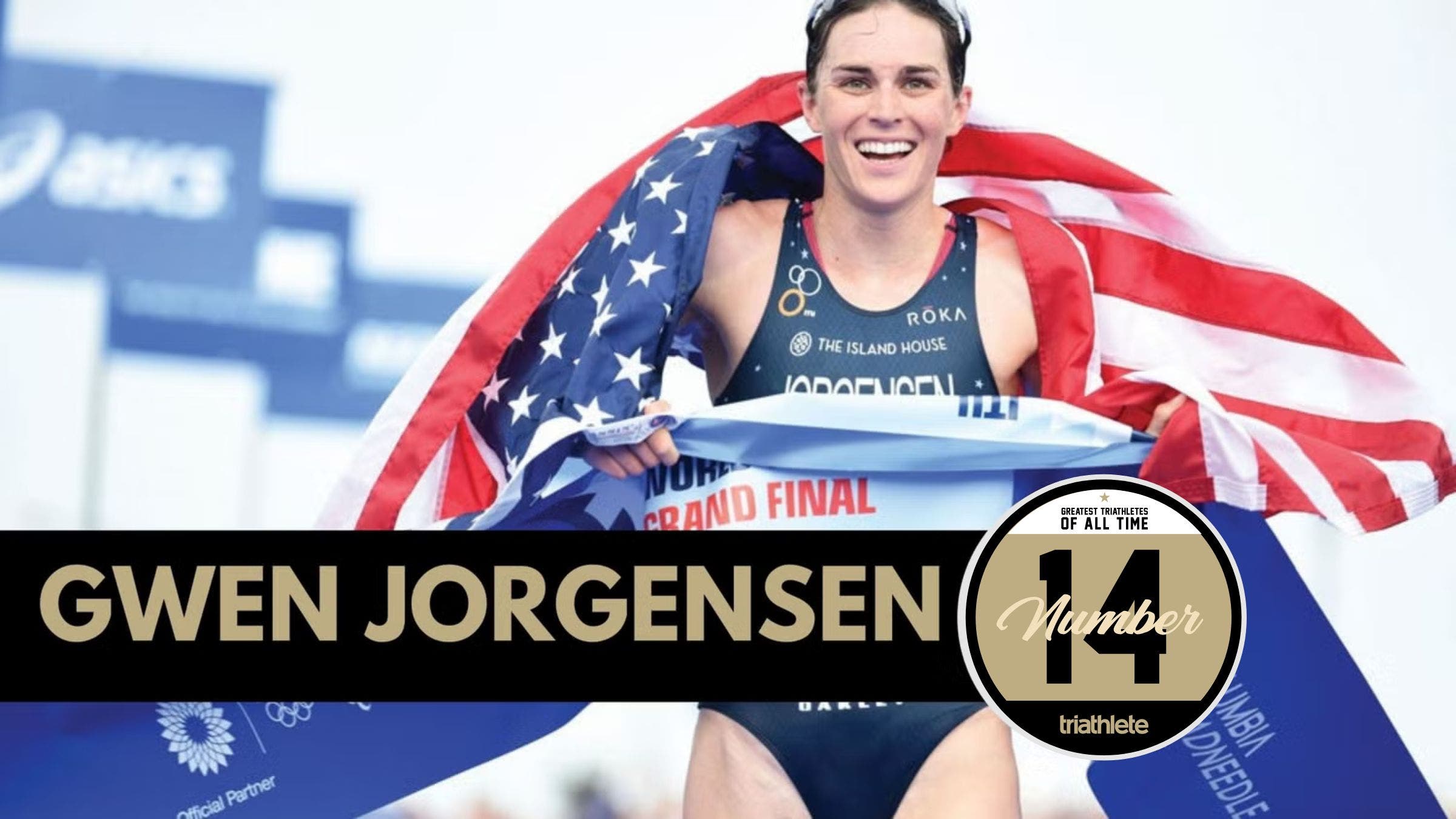
14. Gwen Jorgensen (USA)
Quick Highlights: 2016 Olympic gold medalist, two-time ITU world champion (2014, 2015)
American Gwen Jorgensen didn’t discover triathlon—triathlon discovered her. Fresh out of college with a new career as a certified public accountant, Jorgensen was identified as a potential elite triathlete as part of USA Triathlon’s Collegiate Recruitment Program thanks to her experience as a runner and swimmer at the University of Wisconsin.
Despite her natural talent, Jorgensen wasn’t an immediate star. She spent the first three years of her career learning race tactics and bike-handling skills. After a disappointing 38th-place finish at the 2012 London Olympics, she had a breakthrough performance the following spring at the 2013 ITU World Triathlon San Diego where she became the first American female to ever win an ITU World Triathlon Series race. Shortly after she went on an unprecedented winning streak, thanks in large part to her dominant performances on the run—claiming 13 consecutive World Triathlon Series wins that spanned 2014 to 2016 and gave her two ITU World Championship titles.
The pressure was on Jorgensen heading into the 2016 Rio Olympic Games as the overwhelming favorite. She rose to the challenge, racing her way to the first-ever Olympic gold medal for an American triathlete. Jorgensen went on to race the 2016 Grand Final in Cozumel (where she finished second to Flora Duffy).
“It was great to see Gwen’s transformation from a great runner who did triathlon in 2012 to a world class triathlete who was one of the best runners the sport has ever seen by Rio 2016,” Shepley said. “If Gwen was within three minutes off the bike, you couldn’t count her out for the victory.”
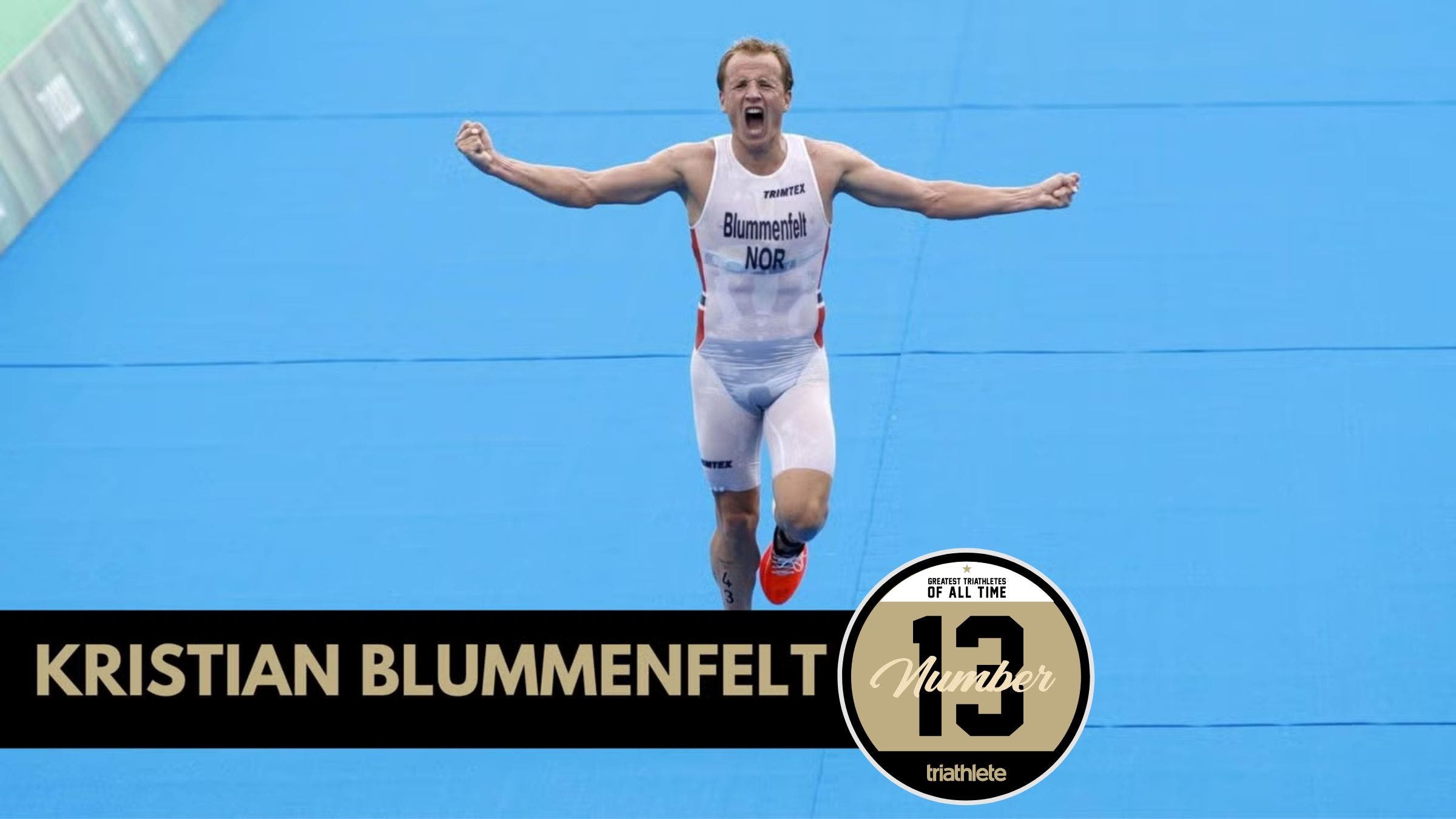
13. Kristian Blummenfelt (NOR)
Quick Highlights: 2020 Olympic gold medalist, 2021 World Triathlon Champion, 2021 Ironman World Champion (St. George), 2022 Ironman 70.3 World Champion, unofficial iron-distance world record (6:44:25) at 2022 Pho3nix Sub-7 Sub-8 event
Kristian Blummenfelt can do it all – and that’s scary for anyone who toes a start line next to him. Whether he’s racing the Tokyo Olympic games, Ironman, 70.3s, PTO Opens, or insane world-record challenges like the Sub7 Project, there seems little the Norwegian powerhouse won’t do (and win).
This wasn’t always the case. From the beginning of his pro career in 2016 until his Olympic Games win in 2021, Blummenfelt flew mostly under the radar as a respectable short-course star with lots of potential. But after clinching the finisher’s tape at the Olympics, that potential exploded: A month later, he became World Triathlon Champion; three months later, he made his Ironman debut in Cozumel with an unofficial fastest-known Ironman time of 7:21:12. The following spring, he clinched his first Ironman World Championship title in St. George, and later that year made it a double by winning the 70.3 World Championships as well. In between those victories, he clocked a 6:44:25 iron-distance finish at the Sub7 exhibition – another unofficial record. In 2023, he showed he can dominate middle-distance triathlon, too, collecting three PTO Open podium finishes in as many races.
“While Blummenfelt might not have as many years at the top as other triathlon greats, he’s packed a decade’s-worth of accolades into a super short period of time,” said Triathlete editor-in-chief Chris Foster. “He’s won at the highest level of every distance in the sport during arguably one of the most competitive eras in triathlon. And he’s probably not done yet.”
Whether it’s riding a bike emblazoned with his suffer-better motto, “It hurts more to lose” or collapsing in a pile of his own vomit at the finish line, Blummenfelt is known for emptying the tank in epic fashion, no matter what distance he’s racing.
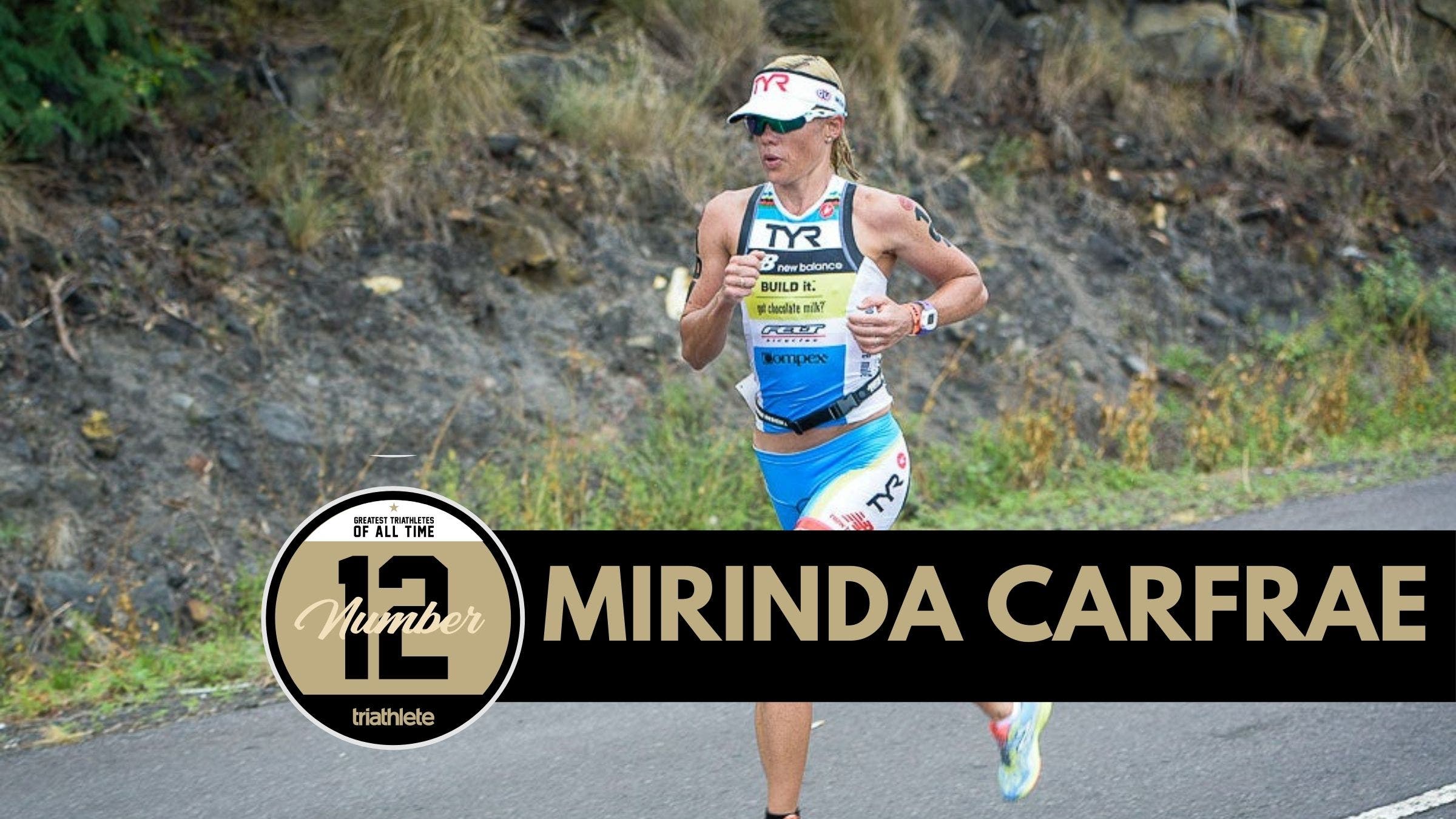
12. Mirinda Carfrae (AUS)
Quick Highlights: Three-time Ironman world champion (2010, 2013, 2014), 2007 Ironman 70.3 world champion
Australia’s Mirinda “Rinny” Carfrae got her start in short-course triathlon, but it was when she made the move to longer races that she really started to excel. She finished third at the 2006 Ironman 70.3 World Championship and then took the victory in 2007. She posted a course-record time of 4:07:25 thanks in large part to her blistering 1:18:40 half-marathon. That run-through-the-field performance was a sign of things to come. She finished second behind Chrissie Wellington (GBR) in her Ironman World Championship debut in 2009 and then went on to win in 2010, 2013, and 2014. Carfrae brought a unique racing style to the women’s field, turning in decent swim and bike performances and ultimately running her way from the middle of the pack to the front.
“Racing Rinny was never comfortable as I knew my lead was never ‘safe,’” explained rival Rachel Joyce of Great Britain, who finished on the Ironman World Championship podium three times. “Rinny was a fierce competitor whose strength was being able to swim and ride strong and then unleash a killer run.”
Carfrae set run course records in Kona in 2009 (2:56:51), 2010 (2:53:32), 2011 (2:52:09), and 2014 (2:50:26)—and that last one stood for nearly a decade before it was broken by Anne Haug (2:48:23, Kona 2023). What makes Carfrae’s feats even more impressive is the fact that the prime of her career spanned that of greats Chrissie Wellington (GBR) and Daniela Ryf (SUI). In addition to the three Ironman world titles, she finished in the runner-up spot three times – twice when Wellington won (2009 and 2011) and once when Ryf won (2016).
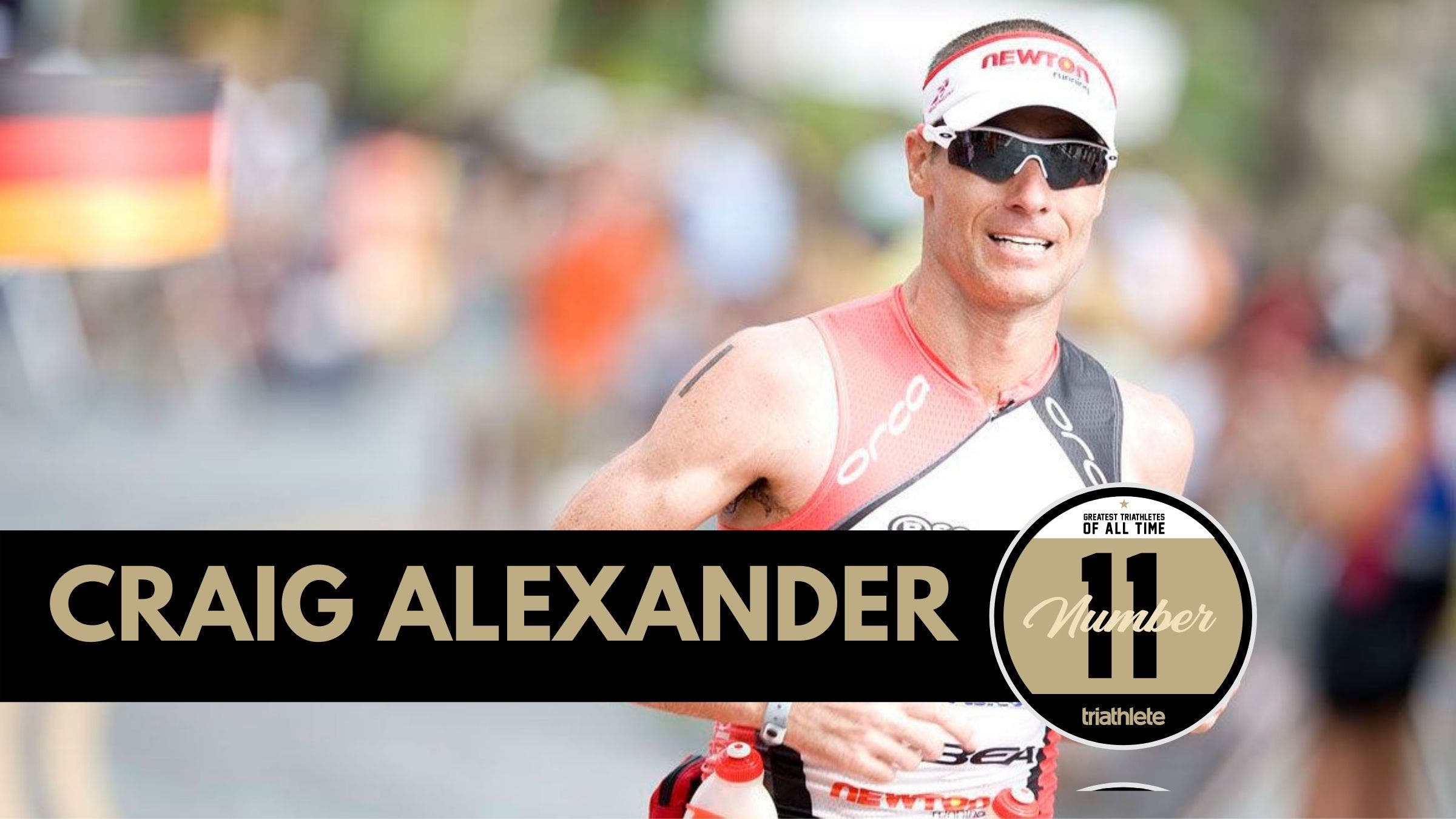
11. Craig Alexander (AUS)
Quick Highlights: Three-time Ironman world champion (2008, 2009, 2011), two-time Ironman 70.3 world champion (2006, 2011)
Australian Craig “Crowie” Alexander got his start in ITU racing, spending a decade spanning the mid-90s to the mid-aughts doing decently well at short-course racing. It was in 2006 that Alexander burst onto the long-course scene, taking the victory at the Ironman 70.3 World Championship and with the runner-up spot at the ITU Long Distance World Championships. He finished second at his debut at the 2007 Ironman World Championship, before winning in 2008 and 2009. Alexander’s standout year was 2011 when he became the first to win the 70.3 and Ironman World Championship in the same year. His 2011 performance in Kona was special in that he finally broke the course record (which has since been broken) that had been held by Luc Van Lierde since 1996.
Alexander was known for coming off of the bike within contention and then running his way to the front of the race—always looking ahead with a stoic look on his face.
American Chris Lieto finished second to Alexander in 2009 and went head-to-head with the Australian several times throughout his career. With his ability to run down the competition, Lieto and the rest of the field were left to rework their race strategies.
“He made me up my game and approach a race in a slightly different way,” Lieto said. The American remembered one specific battle at the 2009 Ironman 70.3 Boise triathlon. Lieto paced himself well on the bike and was holding steady on the run, but Alexander dug deep and caught Lieto one yard before the finish line.
“He was one that no matter what it took he would find that ability to push through,” Lieto explained.
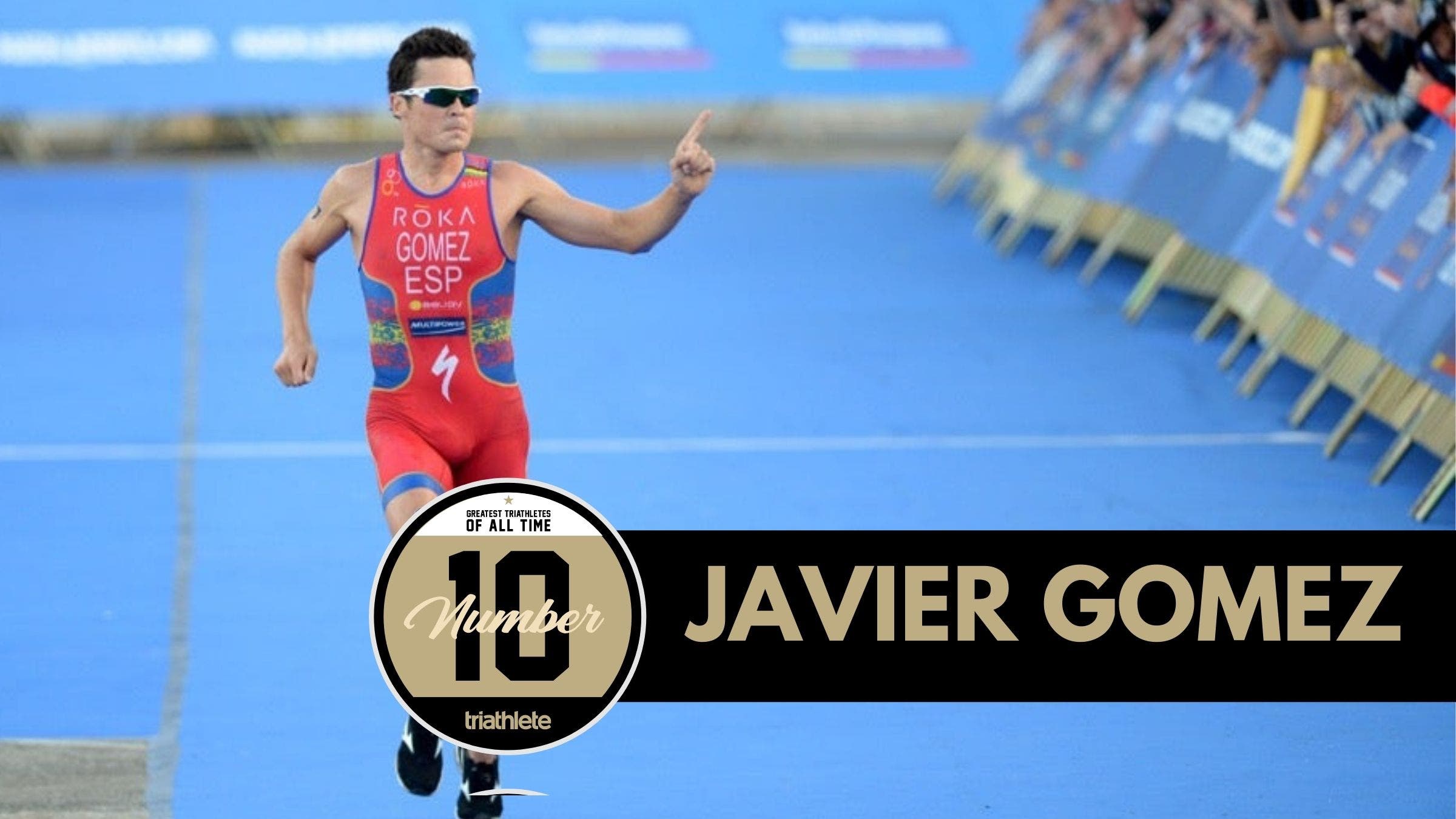
10. Javier Gomez (ESP)
Quick Highlights: 2012 Olympic silver medalist, five-time ITU world champion (2008, 2010, 2013, 2014, 2015), 2012 XTERRA world champion, two-time Ironman 70.3 world champion (2014, 2017)
Spain’s Javier Gomez is one of the most decorated triathletes in the history of short-course racing. While the ITU has changed the way they recognize world champions over the years, Gomez has continued to be in the mix. The Spaniard began his triathlon career at the age of 15 and has been near the top of the rankings since his early 20s. He won the Olympic silver medal in 2012, is a five-time ITU world champion and has shown strength at other disciplines, earning two 70.3 World Championship, and an XTERRA World Championship title along the way.
“With the exception of a few times in his career when he has been injured, Javier Gomez has been the most consistent racer in the world for over a decade,” said longtime commentator Barrie Shepley of watching Gomez throughout his racing years.
While Gomez has a solid spot on this list, there is an element of “what if?” that comes along with his storied career. Gomez has faced his fair share of adversity including missing the 2004 Olympic team, finishing fourth at the 2008 Olympics, and then pulling out of the 2016 Olympics due to an injury suffered in a bike accident while training. Gomez was expected to be a top contender at the Ironman World Championship during the later years of his career. He finished 11th in Kona in 2018 and then returned his focus to Olympic racing.
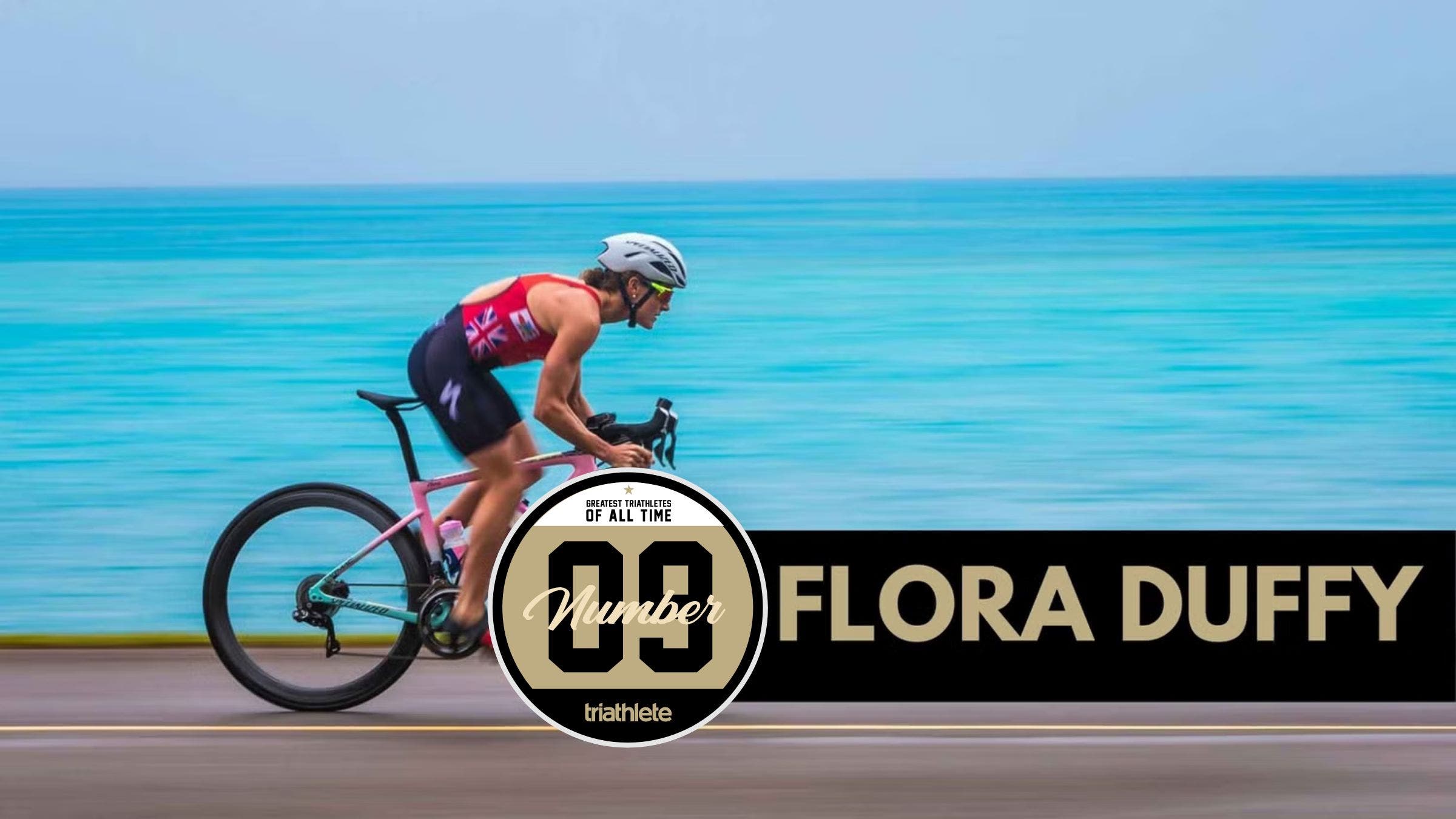
9. Flora Duffy (BER)
Quick Highlights: 2020 Olympic gold medalist, four-time ITU world champion (2016, 2017, 2021, 2022), six-time XTERRA world champion (2014, 2015, 2016, 2017, 2019, 2021)
Though Bermuda’s Flora Duffy has had an impressive career, it was her dominant swim-bike-run at the 2020 Tokyo Olympics (held on July 26, 2021) that propelled her onto this list of the greatest triathletes. Duffy burst onto the scene with a second-place finish at the 2006 Junior ITU World Championships and then steadily worked her way up through the ITU rankings. She suffered disappointing performances at both the 2012 London Olympics (45th) and 2016 Rio Olympics (8th), before earning a breakthrough victory at the 2016 ITU World Triathlon Grand Final in Cozumel and the overall ITU World Championship title. She went on to dominate through 2017 and the first half of 2018, before being sidelined with a foot injury for over a year. She came back stronger than ever and was positioned as the favorite to take Olympic gold in Tokyo. She lived up to the hype, taking the gold with more than a minute to spare—an eternity in Olympic triathlon.
While it’s never been her main focus or speciality, Duffy has also been unstoppable at the XTERRA World Championships—taking the title five times from 2014 to 2019 and another in 2021.
“Probably one of her most enviable traits is the fact that she can deliver on the big day no matter what,” explained rival Lesley Paterson, who is an XTERRA star in her own right. “Her skills on the mountain bike are unmatched and the way in which she morphs into whatever sport she is a part of is unbelievable.”
It’s worth noting that Duffy is probably the biggest “celebrity” on this list of greatest triathletes. The Bermudian can’t go anywhere in her home country without being recognized and has her own public holiday—“Flora Duffy Day,” which took place on Oct. 18, 2021.
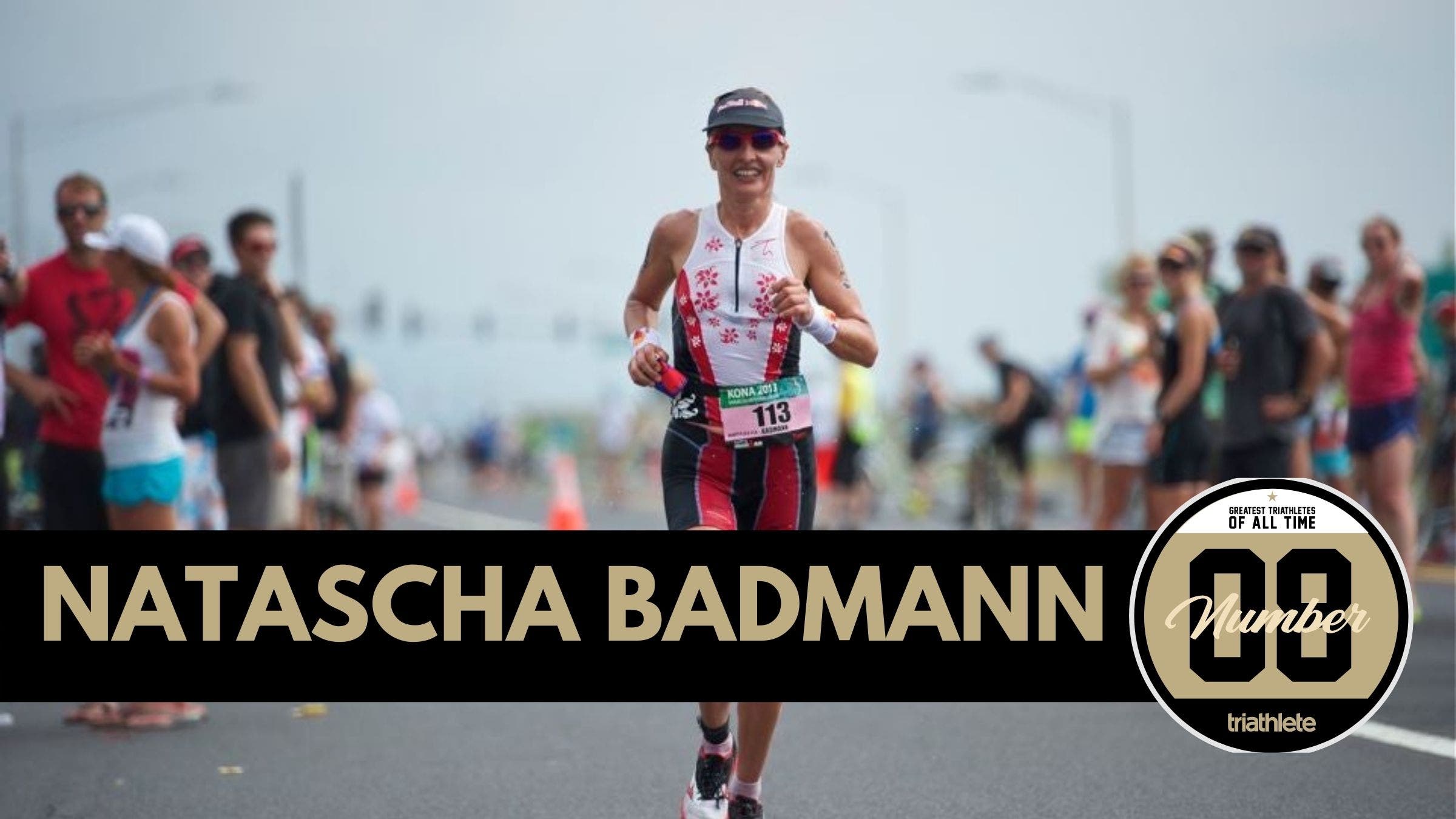
8. Natascha Badmann (SUI)
Quick Highlights: Six-time Ironman world champion (1998, 2000,2001, 2002, 2004, 2005)
Switzerland’s Natascha Badmann was invited to compete in the 1996 Ironman World Championship after winning the Powerman Duathlon. That race in Kona was her first-ever Ironman, and she managed to finish in second place less than five minutes behind the great Paula Newby-Fraser, who won her eighth and final Kona title that day.
Badmann went on to win in 1998, 2000, 2001, 2002, and 2004 (after Germany’s Nina Kraft failed a post-race drug test). As Babbitt put it, Badmann’s strategy was always the same.
“Come out of the water a little bit behind the other top women, blast her way through the field on the bike while building up a big lead, run her way to the win smiling and waving her way through the marathon,” Babbitt remembered.
To earn her final Kona victory in 2005, the Swiss Miss was forced to mix up her strategy thanks to up-and-coming star Michellie Jones. Badmann came from behind to catch Jones 18 miles into the marathon. She famously continued to compete as part of the professional field in Kona well into her 40s, eventually deciding to retire in 2016 at the age of 50.
“One thing that was consistent throughout her amazing career was that she never stopped smiling,” remembered Babbitt.
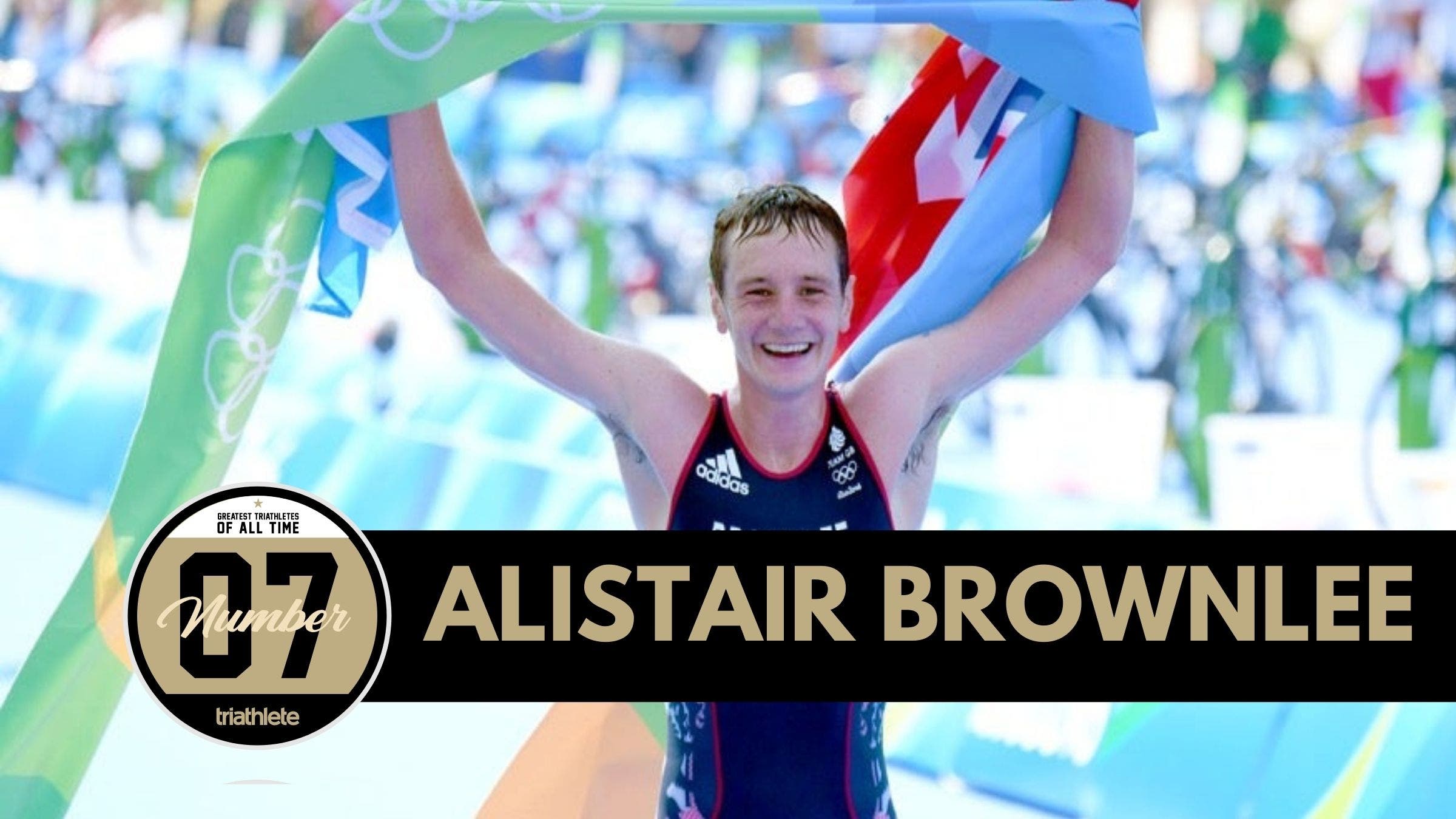
7. Alistair Brownlee (GBR)
Quick Highlights: Two-time Olympic gold medalist (2012, 2016), two-time ITU world champion (2009, 2011)
Some athletes struggle to turn in a top performance when it matters most, but Great Britain’s Alistair Brownlee has shined on short-course triathlon’s biggest stage almost every time. Brownlee was an immediate success in the ITU format, securing the Junior world title (in 2006) and then the U23 world title (in 2008) before jumping up to the elite level. Across short-course racing, he’s known for his aggressive racing style. While his overall performance on the ITU circuit alone is likely enough to place him on this list of the greatest triathletes, it’s his two Olympic gold medals that propel him toward the top. No other triathlete has come close to the feat of claiming back-to-back Olympic gold medals—something accomplished by winning both the 2012 London Olympics and the 2016 Rio Olympics.
“The world has never seen a better one-day triathlete than Ali Brownlee,” Shepley said. “Reckless in his pursuit for the front of the race, Ali was not satisfied winning the race on the run where he was the fastest man over 10k for two Olympic cycles. Ali spent tens of thousands of hours on his bike over his development and wanted to tire the legs out of his competition before the run ever started. In the era of incredible athletes, over the Olympic distance, Ali Brownlee was the undisputed king.”
That all-out style of training and racing has led to a fair share of injuries for Brownlee, which explains some of the gaps on his resume. The Brit has moved on to long-course racing, finishing in the runner-up spot twice at the Ironman 70.3 World Championships. Expectations were high as he took on his Ironman World Championship debut in 2019, but he ultimately finished in 21st. After the pandemic and injuries thwarted his attempt to bring his greatness to iron-distance racing, the Brit picked up a pair of wins in August 2022 at 70.3 Swansea and Ironman Sweden, respectively. He joined the T100 circuit in 2024 to round out his resume, then retired from competition to focus on a new role in the sport: race director.
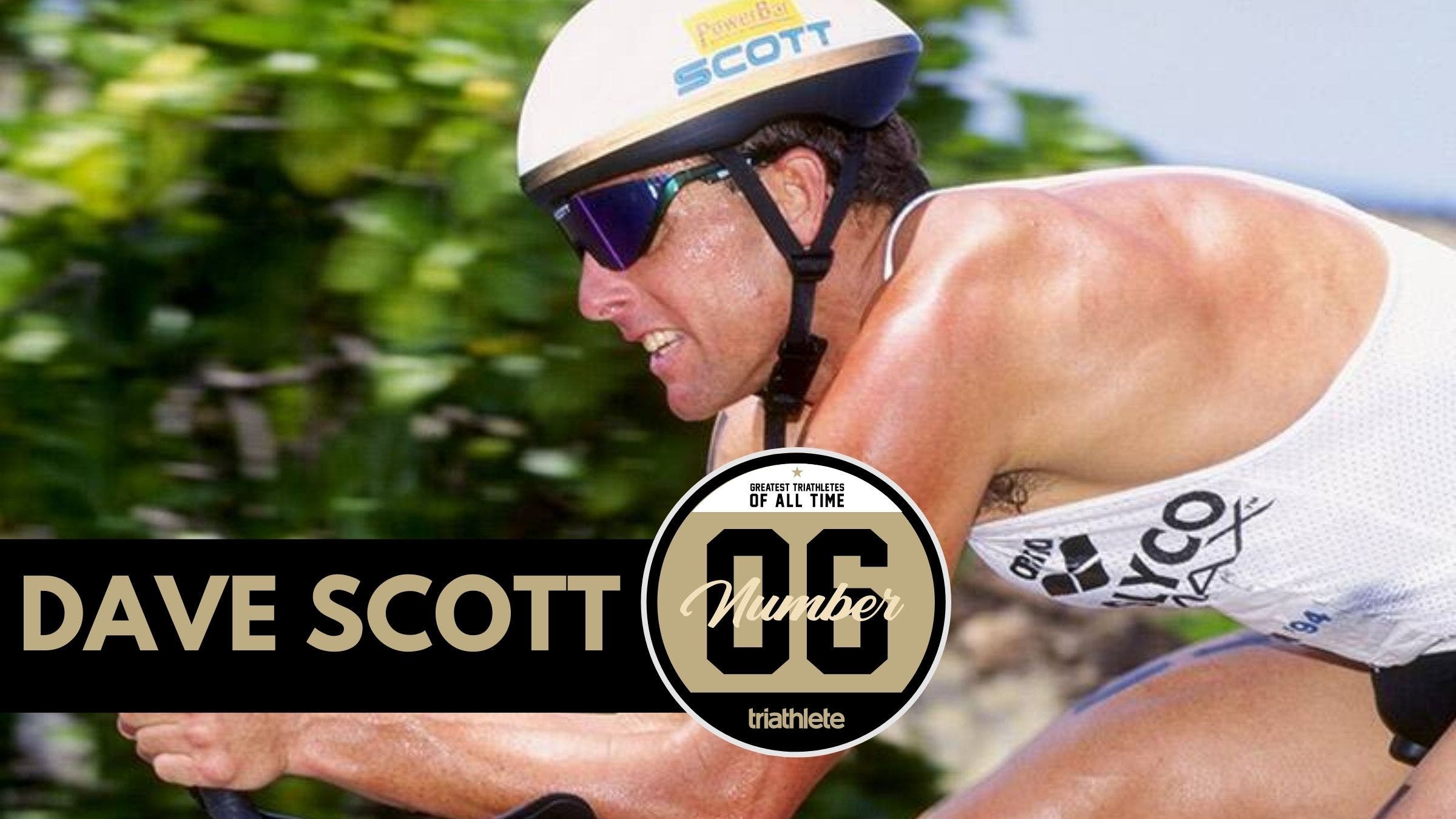
6. Dave Scott (USA)
Quick Highlights: Six-time Ironman world champion (1980, 1982, 1983, 1984, 1986, 1987)
As one of the first great athletes in the sport of triathlon, American Dave Scott still ranks toward the top of the list of greatest triathletes of all time. Scott discovered triathlon after a collegiate career as a water polo player.
“When he found the sport of triathlon and specifically the Ironman, he finally found a sport where he would be rewarded for working harder than anyone else,” Babbitt explained. “And he did. He never put any limits on himself when it came to the Ironman.”
Scott’s efforts made him one of the pioneers of the sport. He was the first athlete to go under 11 hours, under 10 hours, and then under 9 hours in Kona. In a time where records are decided by minutes and seconds, it’s hard to imagine an athlete consistently shattering barriers by hours—but that’s what Scott did.
Scott won six Ironman World Championship titles over the course of his career, a number matched only by his 1989 “Iron War” rival Mark Allen.
“Dave Scott was the guy who broke every record and shattered every perceived boundary to human endurance,” continued Babbitt. “That’s why Dave Scott is known as ‘The Man.’”
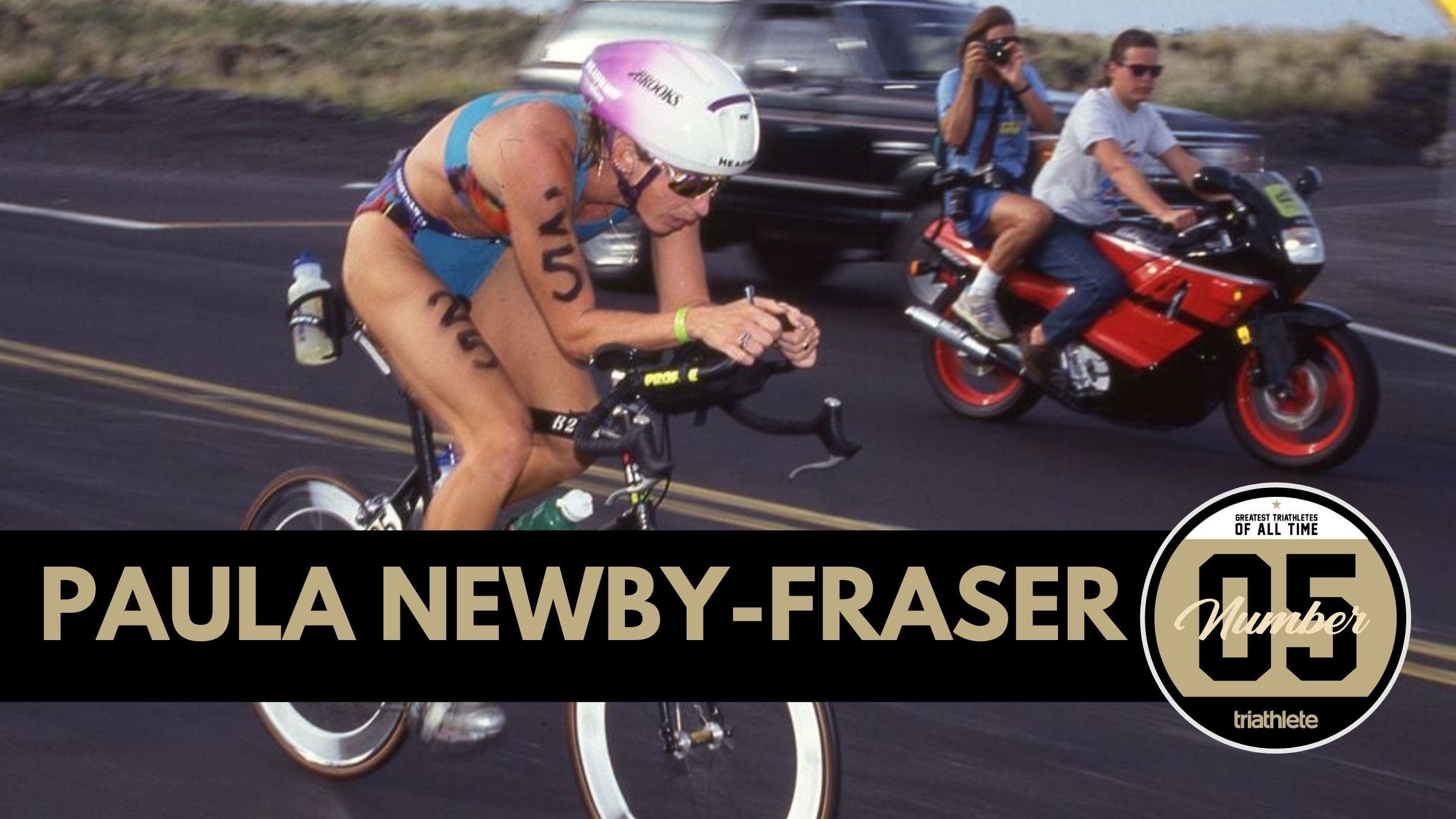
5. Paula Newby-Fraser (RSA)
Quick Highlights: Eight-time Ironman world champion (1986, 1988, 1989, 1991, 1992, 1993, 1994, 1996)
South Africa’s Paula Newby-Fraser finished third at the 1985 Ironman World Championship and then approached the finish line at the 1986 race expecting to end the day in the runner-up spot. The athlete in front of her—Patricia Puntous of Canada—had been disqualified for drafting on the bike, giving Newby-Fraser her first Ironman world title. She finished third the following year and, as Babbitt, put it “people started to wonder if her win in 1986 was a fluke.”
“She proved the world wrong and in 1988 by winning her second title by 11 minutes over Erin Baker, setting a new course record of 9:01:01 while taking 34:24 off of Erin Baker’s course record,” Babbitt continued.
Over the course of her career, Newby-Fraser continued to set records, including becoming the first woman to go under nine hours in Kona in 1992 (with a time of 8:55:28). While the sport has continued to evolve and the times have continued to improve, no athlete has been able to turn in a Kona career that parallels that of Newby-Fraser. With eight Kona titles under her belt and the sport getting more and more competitive, it’s likely the definitive “Queen of Kona” will retain her title for years to come.
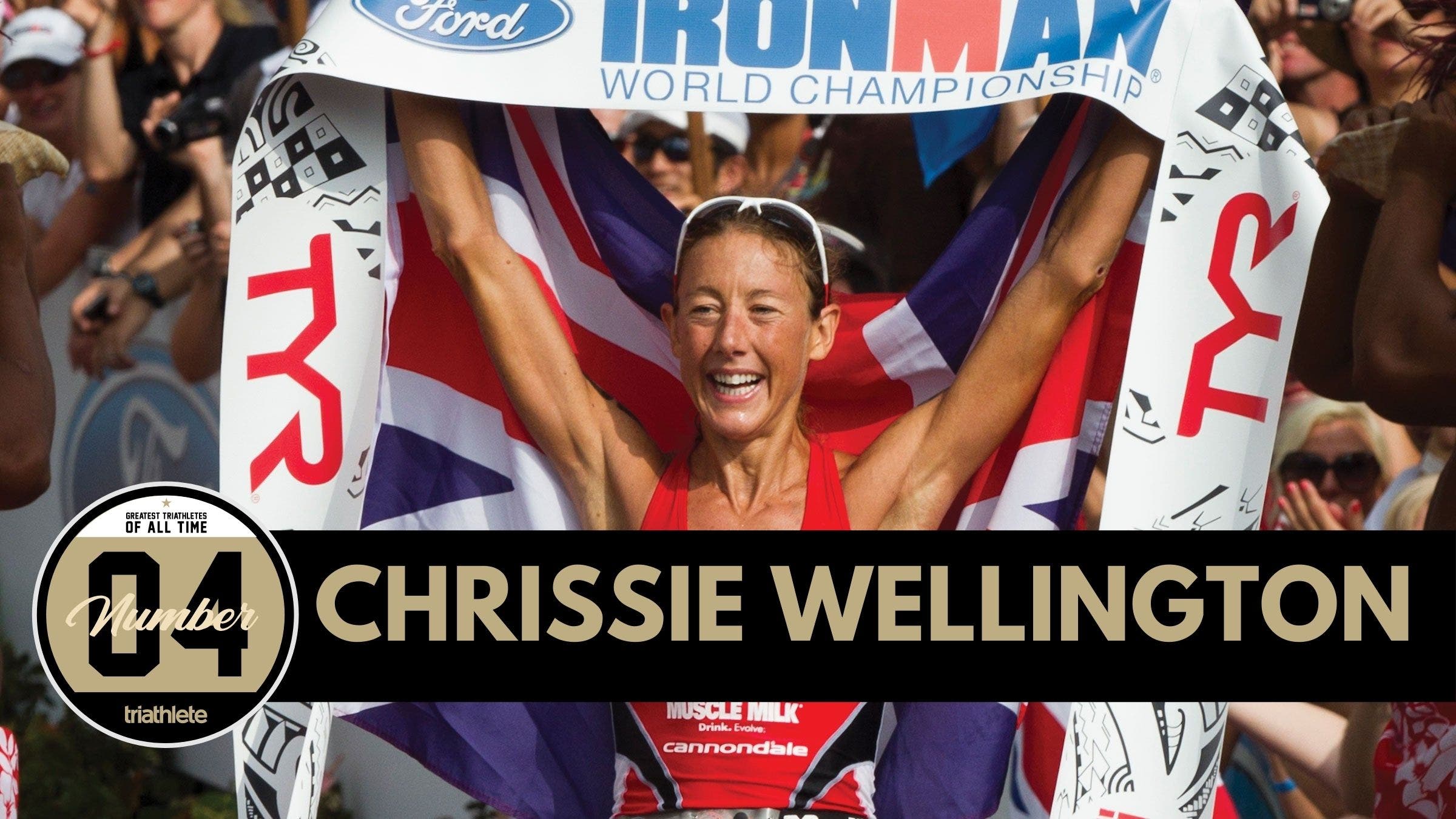
4. Chrissie Wellington (GBR)
Quick Highlights: Four-time Ironman world champion (2007, 2008, 2009, 2011), undefeated at the iron-distance
Why is an athlete who only has four Ironman World Championships so high on the list? Great Britain’s Chrissie Wellington was one of the most dominant triathletes long-course triathlon has ever seen. In 2007, Wellington quietly won Ironman Korea—her first iron-distance race—and earned her spot to the Ironman World Championship. Wellington showed up to the island a complete unknown and off of everyone’s radar—she famously purchased her race kit at the Ironman expo during race week. She dominated the day, finishing more than five minutes ahead of second-place finisher Samantha McGlone of Canada. That Kona victory immediately propelled Wellington into the spotlight. The margin of her victories only continued to grow as she trained and learned more about the distance. She made a habit of competing at the Challenge Roth triathlon, and each year set a new iron-distance record. Her 8:18:13 from the 2011 Roth event stood for over a decade as the fastest iron-distance race by a female before it was finally broken by Daniela Ryf in 2023.
On the Big Island, she blew away the competition at both the 2008 and 2009 Ironman World Championships, winning by 15 minutes and 20 minutes, respectively. Everyone showed up race morning to the 2010 event assuming Wellington would earn her fourth victory, but she pulled out race morning due to an illness—giving Carfrae room to claim her first Kona win.
Wellington was involved in a bike crash in the lead-up to the 2011 Ironman World Championship and showed up to the Big Island injured but determined to race. A pulled pectoral muscle meant a slightly slower time out of the water, but Wellington persevered on the bike and run to earn her fourth Ironman world title.
Following the victory, Wellington first took a break and then officially retired from triathlon at the age of 35.
“As an athlete I sought ‘the perfect race,’” Wellington wrote in her retirement announcement. “That race within myself where I dug to the depths mentally and physically, and that hard-fought race with my competitors. The World Ironman Championships in 2011 was the icing on the cake for me as an athlete. It was my ‘perfect race’ and it ‘completed’ me.”
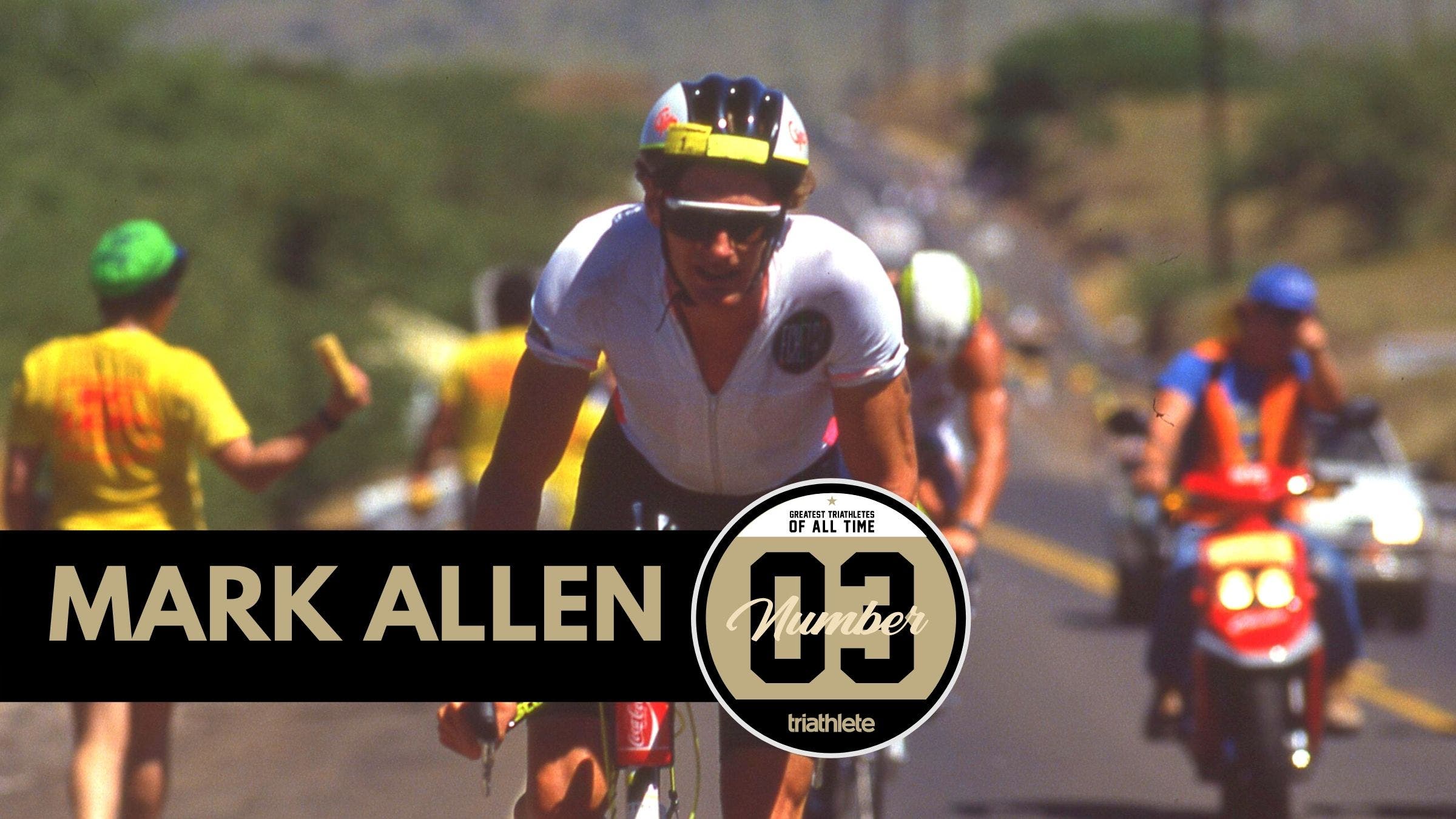
3. Mark Allen (USA)
Quick Highlights: Six-time Ironman world champion (1989, 1990, 1991, 1992, 1993, 1995), 1989 ITU world champion
Mark Allen won the first-ever ITU World Championship in Avignon, France, but that’s not likely what you know him for. That same year Allen competed in the iconic “Iron War” at the Ironman World Championship with rival Dave Scott and earned his first-ever Kona victory, snapping a seven-year losing streak on the Big Island.
Allen was known for his unique mental approach to triathlon, attributing his breakthrough victory in Kona in 1989 to an inner peace that allowed him to pull through and pass Scott.
That was the start of a dominant streak for Allen, who went on to go undefeated at the Ironman World Championship from 1989 to 1993. Within a stretch that spanned from 1988 to 1990, Allen turned in an overall winning streak of 21 races that included events of all distances.
Of Allen’s ability to stay focused and in the moment, Babbitt recalled his final victory in 1995 as the best example.
“He was over 13 minutes down to Thomas Hellriegel off the bike, he had already won the race five times, and he was 37 years old coming back after taking a year off from racing,” Babbitt said. “Rather than be overwhelmed and defeated by having to make up 30 seconds per mile during the marathon, he stayed focused on having the best run he possibly could, no matter what the consequences. By doing that, he eventually caught Thomas Hellriegel about 23 miles into the run.”
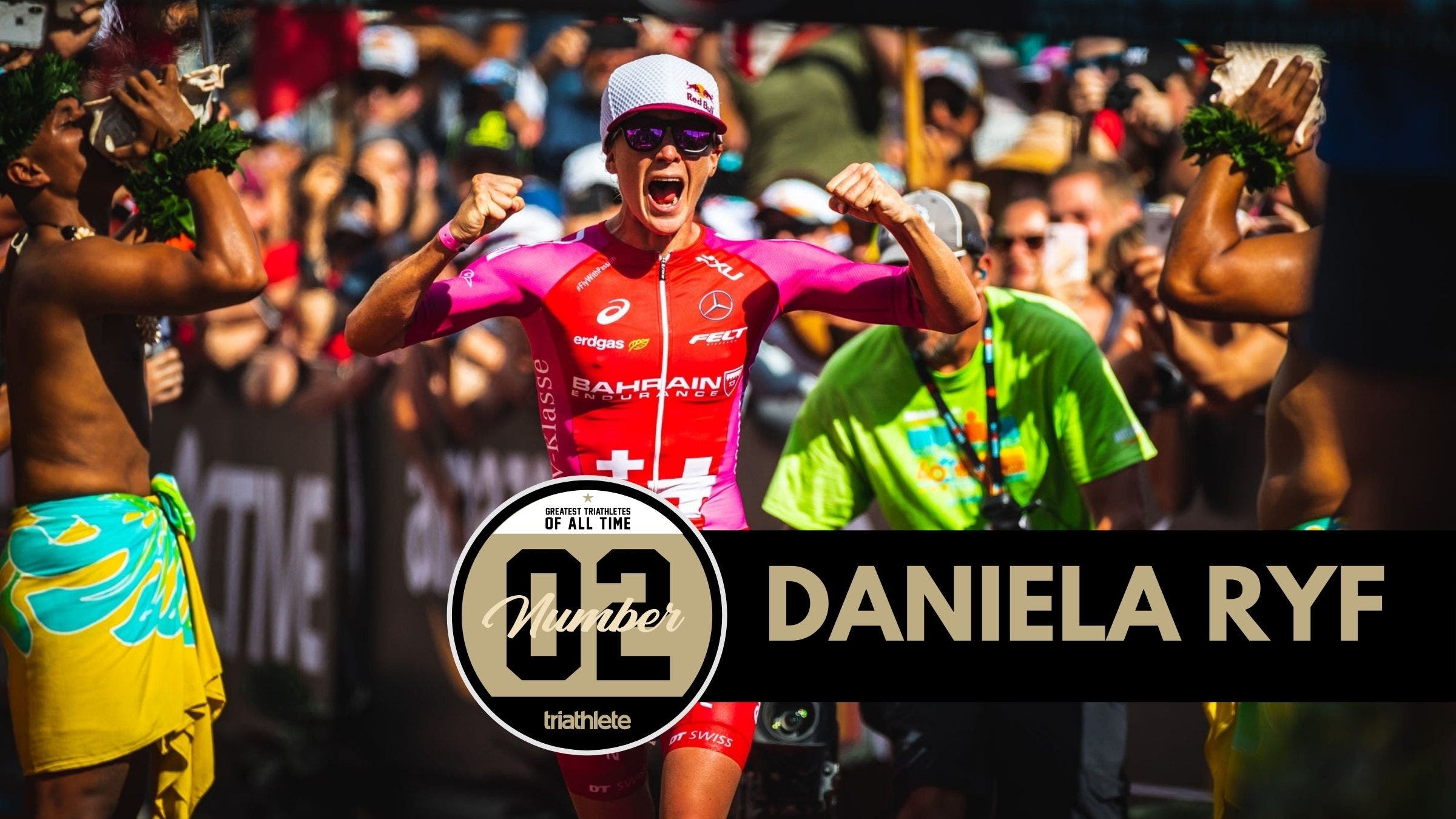
2. Daniela Ryf (SUI)
Quick Highlights: Five-time Ironman world champion (2015, 2016, 2017, 2018, 2021), five-time Ironman 70.3 world champion (2014, 2015, 2017, 2018, 2019)
Switzerland’s Daniela Ryf got her start in short-course racing, racking up a list of decent results—including a seventh-place finish at the 2008 Beijing Olympics—but never breaking through as an ITU star. After finishing a disappointing 40th place at the 2012 London Olympics, Ryf made the decision to switch over to long-course racing.
Ryf immediately found success, winning the 2014 Ironman 70.3 World Championship and then finishing second in her debut at Kona in that same year. From there, Ryf dominated long-course triathlon—racking up four straight Ironman world titles between 2015 and 2018, adding a fifth in 2021, and a total of five 70.3 world titles in that same time frame.
Joyce, who finished on the Kona podium alongside Ryf two times, remembered that Ryf was quiet around her competitors and preferred to let her performance do the talking.
“She was confident at pre-race press conferences but it was like she had an inner confidence so she didn’t need to get involved in ‘smack’ talk,” explained Joyce. “When I went back to Kona in 2017, her dominance had reached a different level to that I had seen in 2015. She has no weakness and races her own race.”
While Ryf has upped the level of competition for women’s long-course triathlon, she has shown she’s human over the years—struggling with injuries and sometimes performing on the big day. She finished fourth at the 2016 70.3 World Championships (but then went on to win in Kona) and later struggled through the 2019 Ironman World Championship (after previously winning the 70.3 World Championships.)
Despite these struggles, Ryf persisted and grew. In 2022, she bounced back to win her fifth Ironman World Championship title on a grueling course in St. George. In 2023, she clocked an 8:08:21 to set what was then a new iron-distance record at Challenge Roth and break Wellington’s long-standing record. After the event, Wellington herself called Ryf “the greatest athlete the sport has seen.” During one of the most competitive periods triathlon has seen, Ryf has not only stepped up – she’s set the bar.
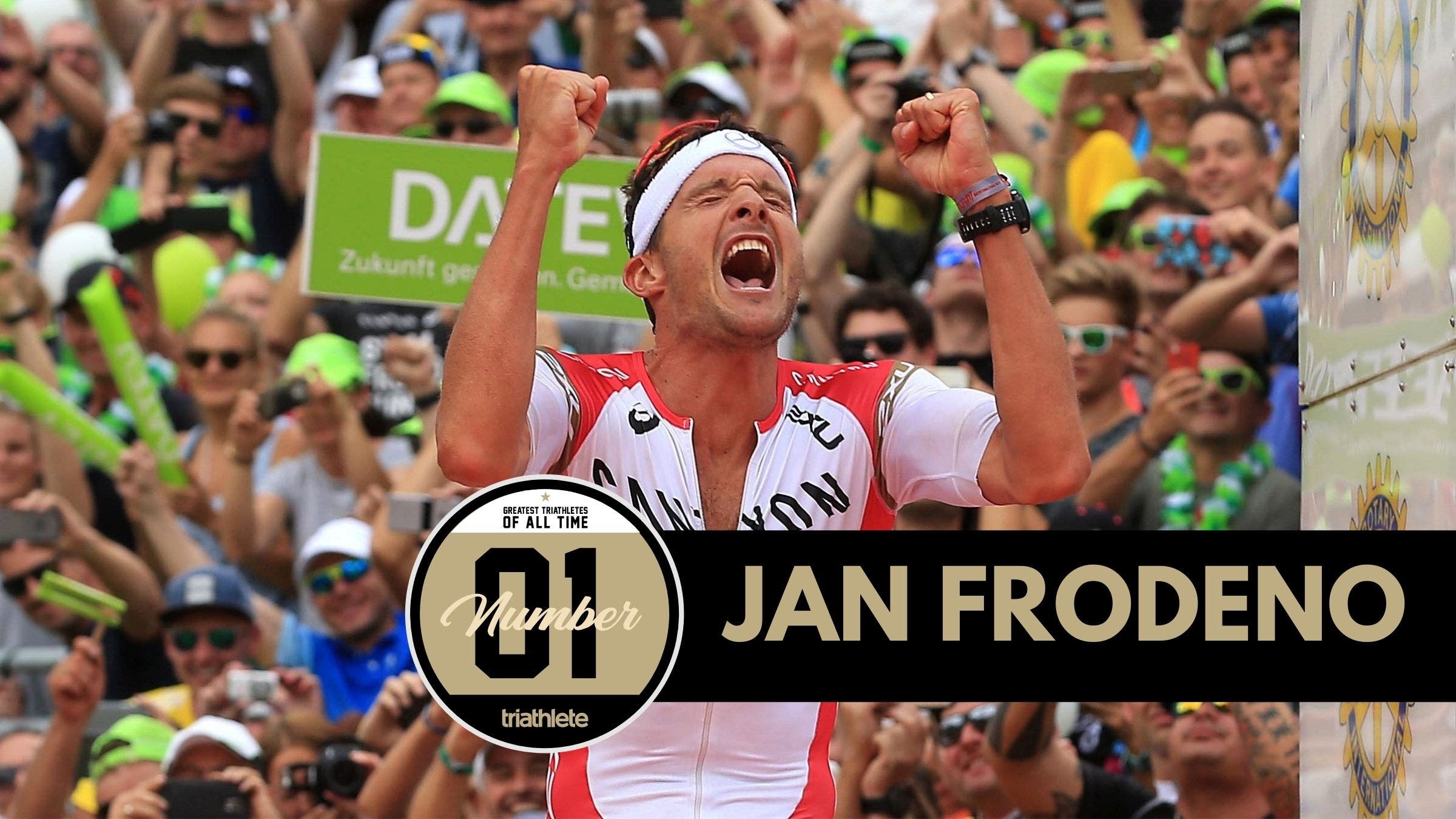
1. Jan Frodeno
Quick Highlights: 2008 Olympic gold medalist, three-time Ironman world champion (2015, 2016, 2019), two-time Ironman 70.3 world champion (2015, 2018)
While Germany’s Jan Frodeno was never a regular, dominant force in the ITU circuit, the fact that he turned up at the 2008 Beijing Olympics and earned the gold medal shows his ability to perform when it matters most.
“Jan has had a habit of picking big days (Olympics and Kona) to extract his best performances,” Shepley said of Frodeno’s success. “That is truly a sign of a huge performer. With attention to details as his hallmark, if the event is important, then you know that Jan is going to be ready from the gun to go for the win.”
There are several Olympic medalists on this list, but what puts Frodeno on top is the fact that he used his career in short course to propel himself into one of the greatest long-course careers the sport has ever seen.
After making the shift to long course following the 2012 London Olympics, Frodeno finished on the podium at both the 2014 70.3 (second) and Ironman World Championships (third). The following year, Frodeno won both events and established himself as a bonafide long-course star. He went to win one more 70.3 world title and two more Ironman world titles, including a 2019 victory in a staggering 7:51:13. He followed that up with a 7:27:53 at the Tri Battle Royale exhibition match against Lionel Sanders in 2021, a win at the Collins Cup that same year, and after taking 2022 off to recover from a string of injuries, returned to the course in fine form with a win at the PTO U.S. Open.
His final race as a professional was Nice 2023, though he will likely still be seen at a race here and there – especially if it’s part of his SGRAIL gravel triathlon series.
The charismatic German star is known for his “Frodissimo,” willingness to go after unique challenges, and not being afraid to speak out about his fellow competitors. His ability to turn in the best performances while facing the toughest competition when it matters most puts him atop the list of the greatest triathletes.